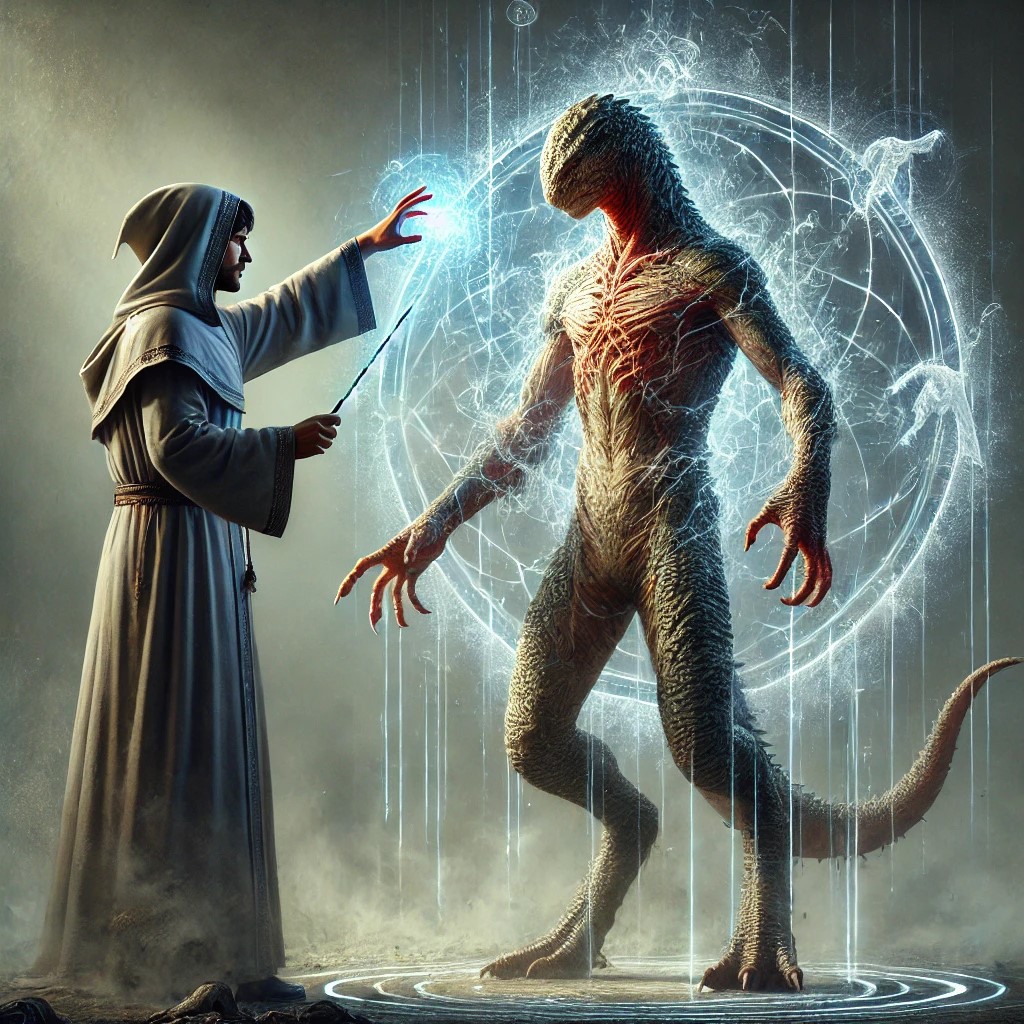Polymorph Other (spell)
Polymorph Other is a spell that completely alters the form, abilities and even the mentality of the recipient, reshaping their body to match any living creature regardless of its natural size or shape. A creature as small as a toad can be transformed into a dragon, though in this case, the physical transformation actually creates the full knowledge, instincts and intelligence of the new form. The victim loses much of their own capacity to think clearly, the moment they are forced into the new body and mind they've been given.
| Range | 5 ft. per level |
| Duration | permanent |
| Area of Effect | 1 creature |
| Casting Time | 2 rounds |
| Saving Throw | none |
| Level | mage (4th) |
Contents
This means that all physical attributes, reflexes and bodily functions are adopted at once, allowing the creature to walk, run, leap, fly or swim as though it had been born into the shape. The transition is not clumsy or awkward — a recipient changed into a horse could gallop with natural efficiency, a hawk soar and a fish swim with ease. The body knows what to do, even if the mind does not.
The greatest difficulty, then, is not in adapting to basic movement, but in the conscious regulation of abilities that are instinctive to the form. The remnants of the creature's former self may struggle with impulses that it does not yet recognise or understand, leading to accidental use of abilities or inappropriate reactions to stimuli. A recipient turned into a dragon, for example, would have no issue flying or using its wings effectively, but would not understand how to hold back its breath weapon — the first yawn or deep exhalation may release a blast of flame or poison without warning. A polymorphed basilisk may unintentionally petrify those around it, a wolverine may lunge at enemies with relentless ferocity before realising the fight is already won, and a frog may find itself leaping to unnecessary heights without meaning to.
Wisdom Checks
In effect, the recipient's wisdom suffers a penalty of -4 points upon transformation. Thereafter, in moments of stress — such as combat, sudden danger or an urgent need to make a decision — the character must make a Wisdom check with this penalty or act purely in accordance with the instincts and natural behaviours of the creature they have become. The longer the transformation persists, the further the recipient's wisdom deteriorates, losing one additional point every week. This progression continues until Wisdom reaches zero, at which point the recipient's mind is completely overtaken, and they become the creature in both thought and instinct, permanently losing all aspects of their former self.
A failed check would mean that the individual would behave according to the form's instincts and natural tendencies. This is not a conscious choice, nor is it something they can rationalize or resist — they simply react as the creature would, regardless of prior intelligence or experience.
A transformed human-turned-wolf, for example, may suddenly chase after a fleeing animal, respond aggressively to loud noises or attempt to establish dominance over nearby individuals. A character turned into a hawk might abruptly take flight at the sight of prey, circling overhead rather than listening to commands or recalling their original purpose. A character turned into a giant spider might seek dark corners, weave webs out of instinct or attack a perceived threat with venomous bites rather than a tactical response.
In combat, this loss of control can result in disruptive, unplanned actions. A polymorphed character might flee when threatened, abandon an ally to chase a weaker opponent or ignore strategy entirely in favour of base instincts. A transformed bear might go into a mindless rage, attacking until the enemy is unmoving, oblivious to commands or attempts to stop them. A creature with flight may instinctively take to the sky rather than stand its ground. A polymorphed shark, if injured, might go into a feeding frenzy, attacking wildly and without regard for friend or foe.
Afterwards, the individual may realise what's happened, but there is a good chance that as wisdom continues to degrade, lapses in memory will result as the character's behaviour aligns more closely with their new form, making it progressively harder to recall or prioritise their original identity.
Restoration
If the original caster of the spell remains present and willing, they may freely choose to reverse the transformation, restoring the recipient to their previous form without the need for additional spells. However, this still requires the recipient to make a system shock roll to survive the sudden return to their natural body — failure results in instant death.
For those seeking to undo a Polymorph Other that was cast by another magic-user or whose caster is unwilling or unavailable, the transformation cannot be dispelled by Dispel Magic, as Polymorph Other is not a sustained magical effect. Once the transformation occurs, it is complete and permanent unless deliberately reversed. The only way to counteract an unwanted Polymorph Other without the caster's cooperation is through the use of Restoration, a 6th-level cleric spell. This forces the character back into his or her original body, overriding the magical transformation. This process is not without risk, as the recipient must still make a system shock roll to withstand the reversion.
